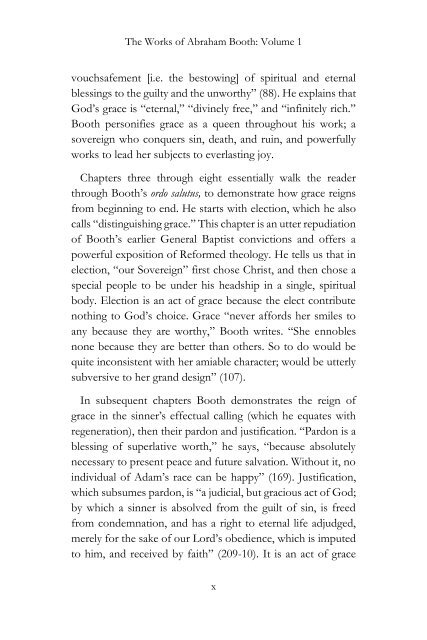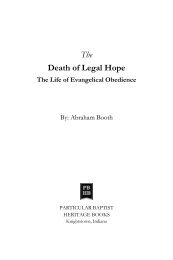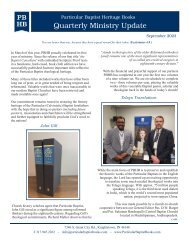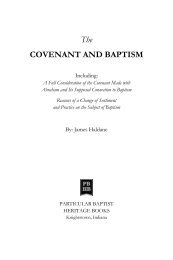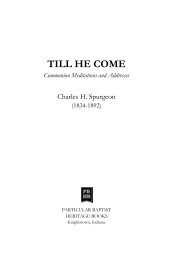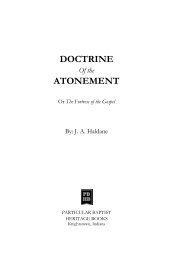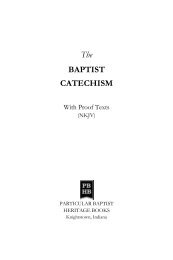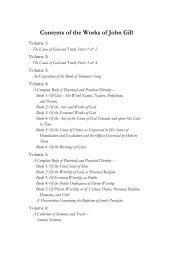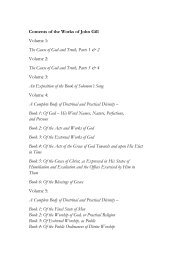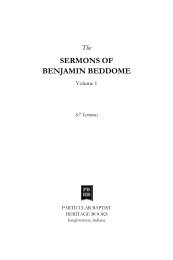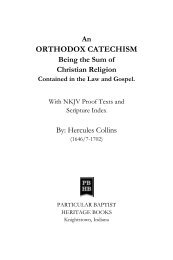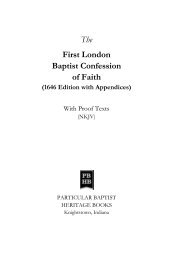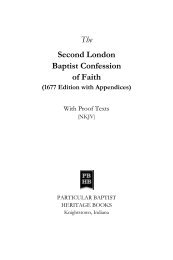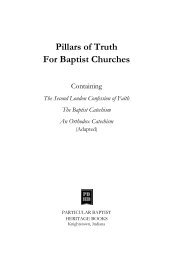Create successful ePaper yourself
Turn your PDF publications into a flip-book with our unique Google optimized e-Paper software.
The <strong>Works</strong> <strong>of</strong> <strong>Abraham</strong> <strong>Booth</strong>: Volume 1<br />
vouchsafement [i.e. the bestowing] <strong>of</strong> spiritual and eternal<br />
blessings to the guilty and the unworthy” (88). He explains that<br />
God’s grace is “eternal,” “divinely free,” and “infinitely rich.”<br />
<strong>Booth</strong> personifies grace as a queen throughout his work; a<br />
sovereign who conquers sin, death, and ruin, and powerfully<br />
works to lead her subjects to everlasting joy.<br />
Chapters three through eight essentially walk the reader<br />
through <strong>Booth</strong>’s ordo salutus, to demonstrate how grace reigns<br />
from beginning to end. He starts with election, which he also<br />
calls “distinguishing grace.” This chapter is an utter repudiation<br />
<strong>of</strong> <strong>Booth</strong>’s earlier General Baptist convictions and <strong>of</strong>fers a<br />
powerful exposition <strong>of</strong> Reformed theology. He tells us that in<br />
election, “our Sovereign” first chose Christ, and then chose a<br />
special people to be under his headship in a single, spiritual<br />
body. Election is an act <strong>of</strong> grace because the elect contribute<br />
nothing to God’s choice. Grace “never affords her smiles to<br />
any because they are worthy,” <strong>Booth</strong> writes. “She ennobles<br />
none because they are better than others. So to do would be<br />
quite inconsistent with her amiable character; would be utterly<br />
subversive to her grand design” (107).<br />
In subsequent chapters <strong>Booth</strong> demonstrates the reign <strong>of</strong><br />
grace in the sinner’s effectual calling (which he equates with<br />
regeneration), then their pardon and justification. “Pardon is a<br />
blessing <strong>of</strong> superlative worth,” he says, “because absolutely<br />
necessary to present peace and future salvation. Without it, no<br />
individual <strong>of</strong> Adam’s race can be happy” (169). Justification,<br />
which subsumes pardon, is “a judicial, but gracious act <strong>of</strong> God;<br />
by which a sinner is absolved from the guilt <strong>of</strong> sin, is freed<br />
from condemnation, and has a right to eternal life adjudged,<br />
merely for the sake <strong>of</strong> our Lord’s obedience, which is imputed<br />
to him, and received by faith” (209-10). It is an act <strong>of</strong> grace<br />
x


